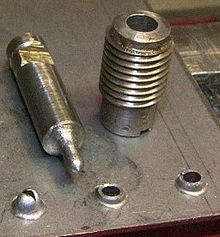This article needs additional citations for verification. (January 2010) |

Punching is a forming process that uses a punch press to force a tool, called a punch, through the workpiece to create a hole via shearing. Punching is applicable to a wide variety of materials that come in sheet form, including sheet metal, paper, vulcanized fibre and some forms of plastic sheet. The punch often passes through the work into a die. A scrap slug from the hole is deposited into the die in the process. Depending on the material being punched this slug may be recycled and reused or discarded.
Punching is often the cheapest method for creating holes in sheet materials in medium to high production volumes. When a specially shaped punch is used to create multiple usable parts from a sheet of material (i.e. the punched-out piece is the good piece), the process is known as blanking. In metal forging applications the work is often punched while hot, and this is called hot punching. Slugging is a type of metal-punching operation in which the action of the punch is stopped as soon as metal fracture is complete; the punched piece is not removed but is left in the hole.